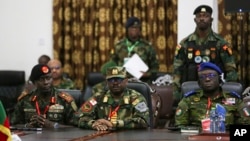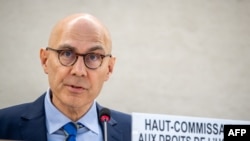The Economic Community of West African States is prepared to send troops against Niger’s military junta if diplomacy falters, the bloc’s commissioner for political affairs and security said Friday.
“We are ready to go anytime the order is given,” Abdel-Fatau Musah said. “The D-Day is also decided, which we are not going to disclose.”
Nevertheless, ECOWAS leaders noted that they favored the language of diplomacy over the sound of war and said they might send a diplomatic mission to Niamey as early as Saturday to try to resolve the situation amicably with the military junta and restore constitutionally elected President Mohamed Bazoum to office.
There was no immediate response from Niger’s junta.
Bazoum was overthrown July 26. So far, the junta has ignored calls from the United Nations, ECOWAS and others to reinstate him, prompting the bloc to order a standby military force to be deployed in Niger.
Most of ECOWAS's 15 members are ready to contribute to a potential military force against Niger. Those opposing are three other countries under military rule — Mali, Burkina Faso and Guinea — as well as Niger itself.
Multiple coups
Niger’s coup is at least the sixth in the region in the last three years, testing the credibility of ECOWAS, which had asserted it would not tolerate any more coups in the region.
"The decision is that the coup in Niger is one coup too many for the region, and we are putting a stop to it at this time. We are drawing the line in the sand," Musah said.
Military intervention could destabilize the impoverished Sahel region, which for 10 years has been dealing with Islamic sectarian violence linked to al-Qaida as well as with dire poverty and hunger, despite Niger's being a significant uranium and oil producer in West Africa.
Last month, ECOWAS’s top officials told the U.N. Security Council that the bloc needed at least $2.3 billion annually to establish a 5,000-strong brigade for the region.
The executive director at the West Africa Center for Counter-Extremism, Mutaru Mumuni Muqthar, said ECOWAS does not have the economic resources to sustain a military intervention in Niger.
“In terms of military hardware, the equipment and numbers of men on the ground that we need, we don’t seem to have the numbers,” he said.
U.N. High Commissioner for Human Rights Volker Türk called on Niger’s generals to avert war, release Bazoum and allow for democracy to be reinstated. Bazoum, his son and his wife have been held in reportedly difficult living conditions in the basement of his palace in Niamey since the coup.
Türk said he was very concerned about the junta’s announcement to prosecute Bazoum and his allies for high treason.
“This decision is not only politically motivated against a democratically elected president but has no legal basis, as the normal functioning of democratic institutions have been cast aside,” he said.
Effects on refugees
While tensions run high in the region, the secretary-general of the Norwegian Refugee Council, Jan Egeland, expressed deep concern about the spiraling situation in Niger, which was already dealing with humanitarian crises.
"We are particularly worried about the fallout of any conflict on refugees coming from ECOWAS countries, and about new forced displacements an armed escalation could prompt,” he said.
Latest figures from the U.N. refugee agency put the number of forcibly displaced people in Niger at well over 700,000. U.N. Refugee Agency spokesperson Matthew Saltmarsh said that included almost 350,000 refugees, just over 50,000 asylum-seekers and nearly 350,000 internally displaced people.
More than 10 million people in Niger - more than 40% of the population - were already facing extreme poverty, a situation that will only worsen if sanctions affect the general population.
“We are calling at least for humanitarian exemptions to sanctions to avert a rapid deterioration of the food security and malnutrition situation in the country,” said Ravina Shamdasani, a spokesperson for the U.N. high commissioner for human rights.
VOA’s Lisa Schlein and Kent Mensah contributed to this report. Some information came from Reuters, The Associated Press and Agence France-Presse.






